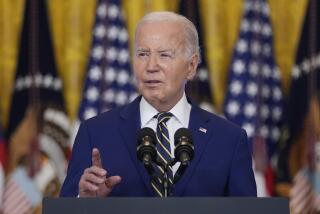Soviets Decree Amnesty for Prisoners; Extent Unclear
MOSCOW — The Soviet Union on Friday decreed a limited prison amnesty to mark the 70th anniversary of the Russian Revolution, but it did not say how many people are involved or whether political prisoners were included.
The decree, published in the government daily Izvestia, appeared to cover more prisoners than previous releases.
The complex decree was issued by the Supreme Soviet. It occupied a quarter-page in Izvestia and was signed by Soviet President Andrei A. Gromyko.
Like other amnesties proclaimed for state holidays over the years, the latest order listed numerous exceptions, such as prisoners convicted of “especially dangerous crimes against the state.”
That exception includes the “anti-Soviet agitation and propaganda” law under which many dissidents and human rights activists have been sentenced to prison and labor camp.
But the decree did not specifically exclude people convicted of anti-Soviet slander, a legal charge that has also been used against dissidents and people convicted of violating laws regulating the practice of religion.
The amnesty applies to war veterans, recipients of Soviet medals and orders, men over 60 years old, women older than 55 and invalids.
The decree calls for the dismissal of any cases pending against those people.
Among those not eligible for the amnesty are people convicted of violent crimes, large-scale bribery and corruption.
The official Tass news agency said that, for the first time, the amnesty provides for reducing the terms of prisoners in labor camps, but the order did not make clear which prisoners would qualify.
The decree says the amnesty takes effect immediately and will extend over the next six months.
More to Read
Sign up for Essential California
The most important California stories and recommendations in your inbox every morning.
You may occasionally receive promotional content from the Los Angeles Times.










